No Products in the Cart
Zulekha Nishad, based in India, is a skilled content specialist, copy editor, and creative content writer with a Master's degree in English Language and Literature. Read more
Last Updated April 30, 2025
Are you in a dilemma about whether to go for a Queen or Twin XL mattress? If so, you won't want to miss out on this blog post that will help you understand the differences between both these mattress sizes. Whether you're looking for something big enough for two people or just need some additional space, this guide will provide all the information necessary for making the best decision!

Key Takeaways:
Let's kick things off by introducing the Queen mattress. The Queen is a popular choice among couples who like to spread out and enjoy a bit of extra room. The Queen size bed dimensions measure approximately 60 X 80 inches. Mattresses of this size are designed to accommodate two adults comfortably, providing more space than a full or double mattress while taking up less room than a king size mattress.

So, how much does a Queen mattress cost? Well, they come with a slightly higher price tag compared to smaller sizes due to their size and popularity.
A queen size mattress can cost anywhere from $500 to $3000. If you're looking for natural or organic materials and advanced sleep technologies like a zoned support system, be prepared to pay a higher price.
Now, let's shift our focus to the Twin XL mattress. This mattress size is a great choice for single sleepers who value extra legroom or for those with limited bedroom space.
A Twin XL measures 38 X 80 inches, making it the same length as a Queen but significantly narrower. This added length makes it a comfortable option for taller individuals who don't want their feet hanging off the edge.
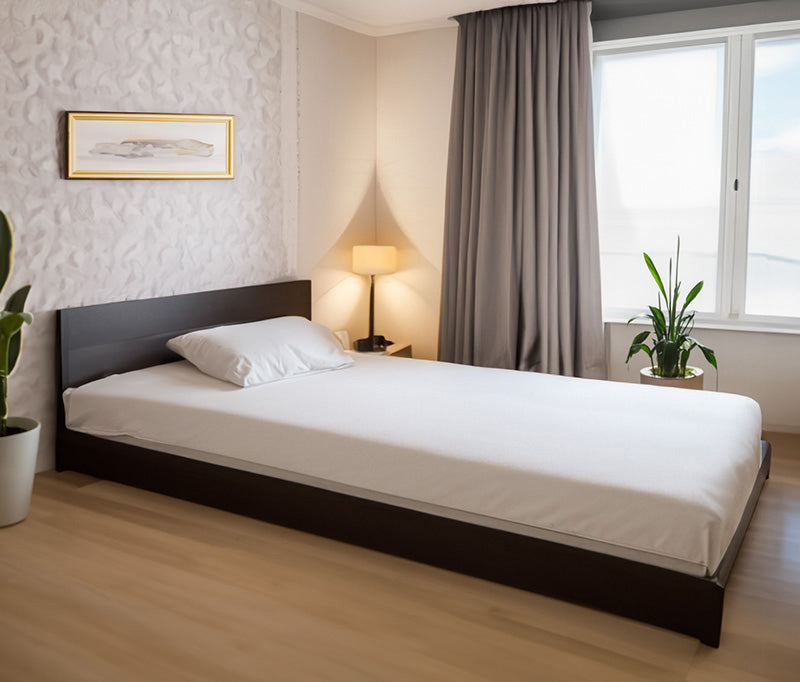
Twin XL mattresses are generally more budget-friendly than their larger counterparts, making them an excellent option for those watching their wallets.
The average cost of a Twin XL mattress falls between $100 and $2000. The price depends on how thick the mattress is and how many layers it has, with more layers making it pricier. Special features like cooling technology can also increase the cost.
Let's break down the differences between Queen and Twin XL beds in a handy comparison chart:
| Parameters | Queen Mattress | Twin XL Mattress |
|---|---|---|
| Dimensions | 60 x 80 inches 152 X 203.5 cm 5 X 6.66 feet |
38 x 80 inches 96.5 X 203.5 cm 3.16 X 6.66 feet |
| Ideal for | Couples | Single sleepers or tall individuals |
| Room Size | At least 10 x 10 feet Larger bedrooms |
Larger than 7 X10 feet Smaller bedrooms, dorms, guest rooms |
| Cost of Bedding | Higher due to size | Lower due to smaller size |
Now that you have a clear picture of the differences between Queen and Twin XL mattresses, it's time to make a decision. Here are some key factors to consider when choosing between the two:
Measure the dimensions of your bedroom carefully. A Queen bed requires more space, with its dimensions of 60 X 80 inches. It's ideal for larger master bedrooms with dimensions of at least 10 feet X 10 feet, providing ample space for other bedroom furniture as well.
On the other hand, a Twin XL mattress, with its 38-inch width and 80-inch length, is more suitable for smaller rooms, including guest bedrooms, children's rooms, or dormitories. It can comfortably fit in rooms as small as 9 feet 6 inches X 10 feet 6 inches, allowing room for other essential furnishings.
If you share your bed with a partner, a Queen size bed is generally more practical. It offers more width, allowing both sleepers to have their own space without feeling cramped. Moreover, a Queen bed can comfortably accommodate couples or even parents and a child or pet.
Consider your budget not just for the mattress itself but also for accessories like sheet sets, duvets, and bed frames. Keep in mind that Queen-sized bedding and accessories tend to be more expensive than those for Twin XL. Factor in these costs to ensure your budget aligns with your choice.
Take into account the height of the individuals who will be using the mattress. If you or the intended sleeper is on the taller side, the additional length of a Twin XL size mattress can make a significant difference in comfort. It provides an extra 5 inches in length compared to a Queen, which can be particularly beneficial for tall individuals.
Think about your future living arrangements and bedroom space. If you anticipate moving to a larger bedroom or plan to share your bed with a partner in the future, investing in a Queen bed can be a wise choice. It ensures you won't outgrow your bed too quickly and provides more room for shared sleep.
By weighing these factors and your personal preferences, you can confidently choose between the Queen and Twin XL beds, ensuring restful nights of sleep.
Before we wrap things up, let's take a quick peek at some mattress sizes other than Queen and twin XL you might encounter:

Twin size bed dimensions: 38 x 75 inches.
Recommended Room Size: At least 7 x 9 feet.
Best for: Kids, teens, or single adults. Common choice for kids' bedrooms.
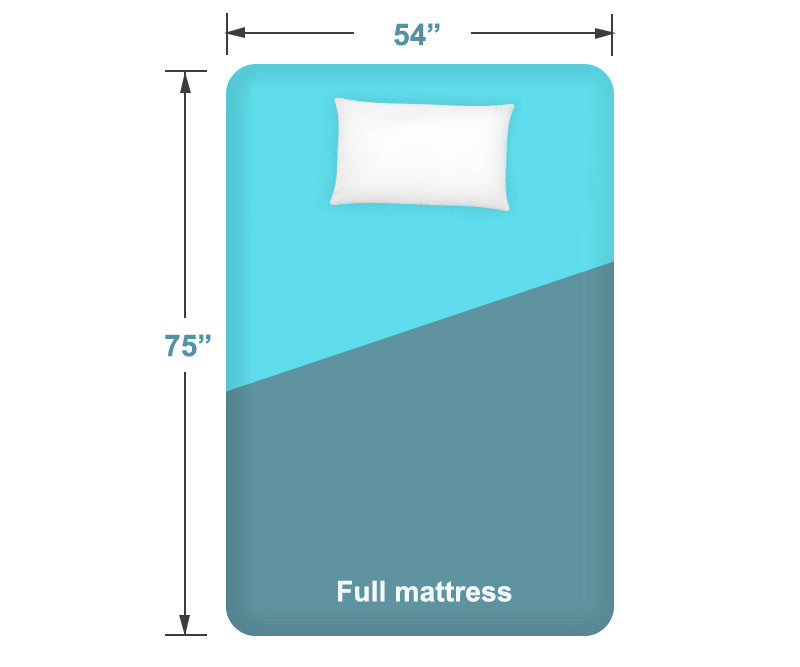
Full size bed dimensions: 54 x 75 inches.
Recommended room size: At least 9.6 x 10.6 feet.
Best for: Single adults and teens. Common choice for college dorms and studio apartments
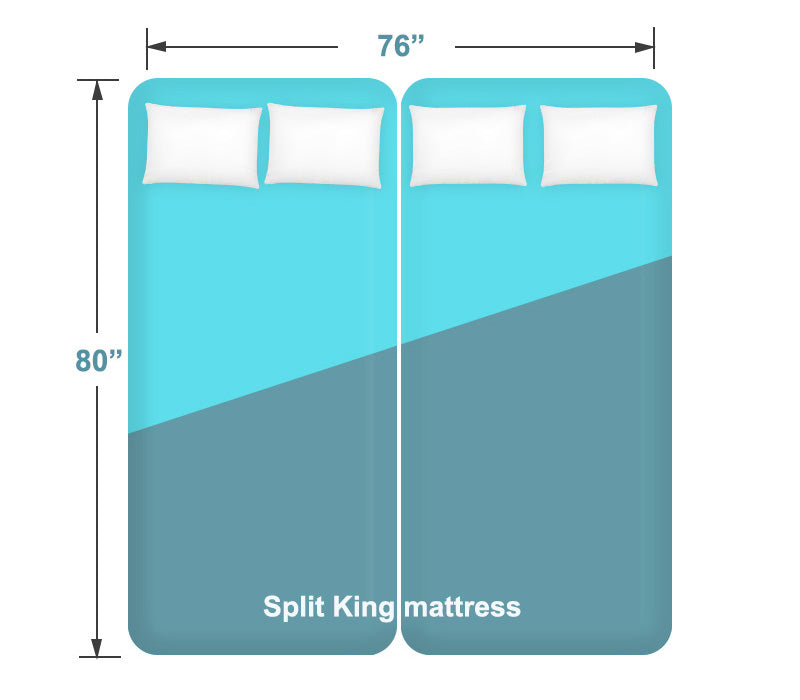
Split Queen size bed dimensions: Two mattresses, each measuring 30 x 80 inches.
Recommended Room Size: At least 10 x 10 feet.
Best for: Couples who wants to customize their side of the bed independently. Each sleeper gets a 30-inch wide mattress, providing ample personal space.
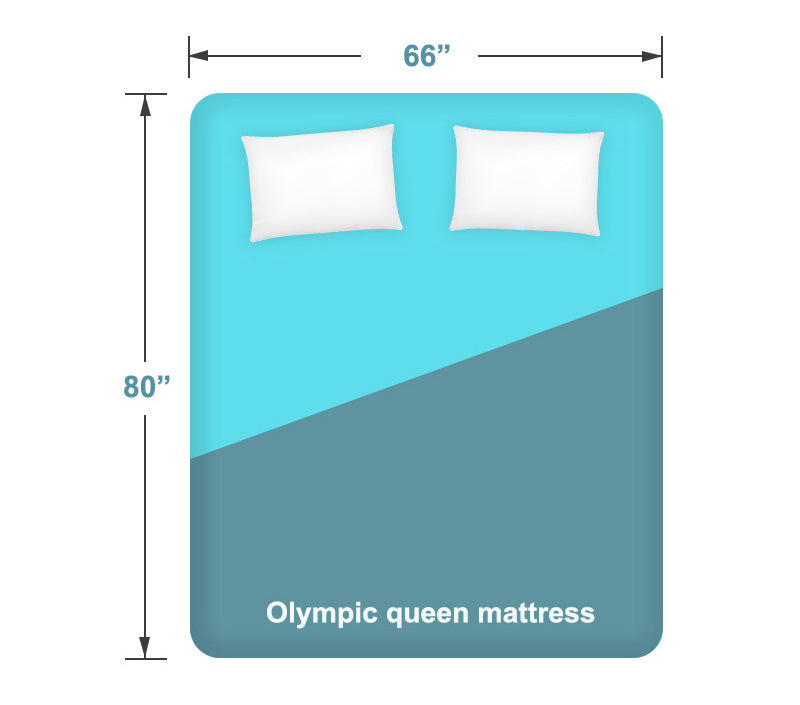
Olympic Queen size bed dimensions: 66 x 80 inches.
Recommended room size: At least 10 x 10 feet.
Best for: Couples who like a bit more room.
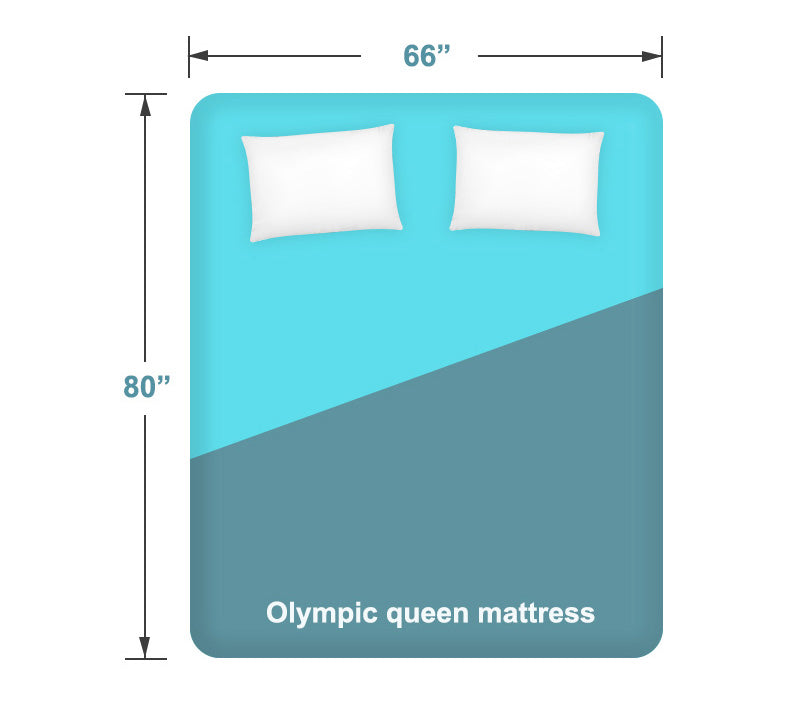
California Queen size bed dimensions: 60 inches wide x 84 inches long.
Recommended room size: At least 10 feet x 12 feet.
Best for: Taller individuals or couples who want extra length without the width of a standard king-size bed.
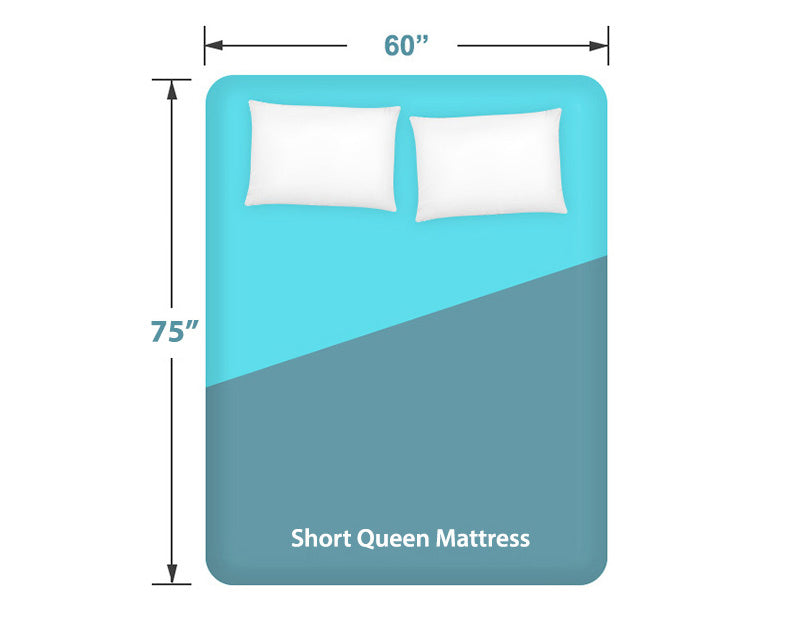
Short Queen size bed dimensions: 60 inches wide x 75 inches long.
Recommended room size: At least 10 feet x 10 feet.
Best for: RVs, trailers, or spaces with limited length. It provides more width than a regular RV queen mattress.
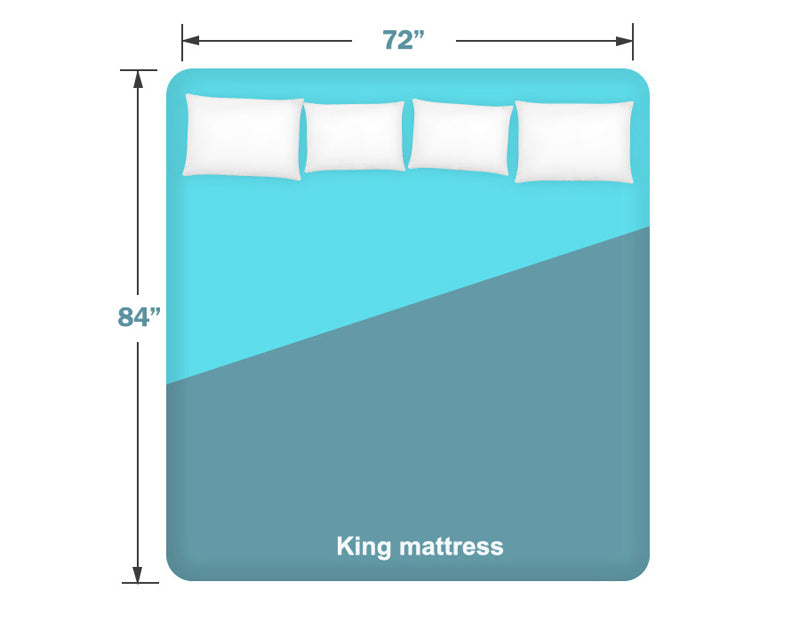
King size bed dimensions: 72 inches in width x 84 inches in length.
Recommended room size: At least 12 feet x 12 feet.
Best for : Taller individuals and couples who prefer extra legroom. Can comfortably accommodate two adults and possibly a child or pet.
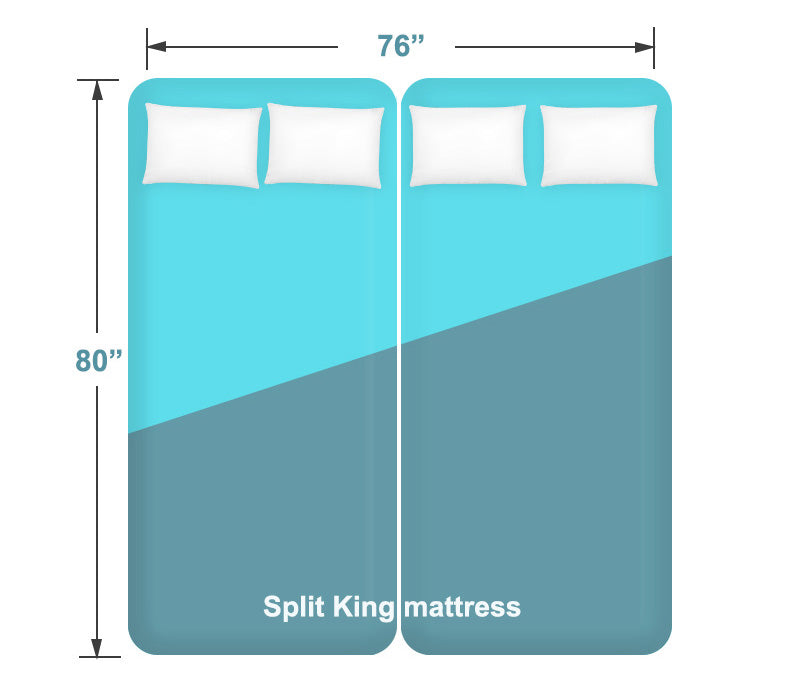
Split King size bed dimensions: Two Twin XL mattresses, each measuring 38 x 80 inches.
Recommended room size: At least 12 X 12 feet.
Best for: Couples with different sleeping preferences who want individual customization. Can comfortably accommodate two adults.
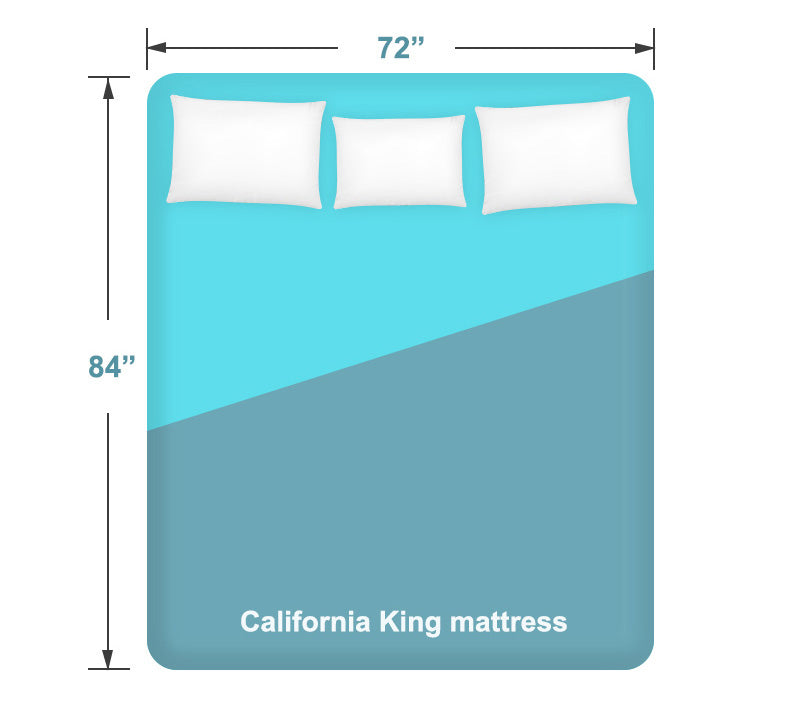
California King size bed dimensions: 72 x 84 inches.
Recommended room size: At least 12 feet x 12 feet.
Best for: Taller individuals and couples who prefer extra legroom. Can comfortably accommodate two adults and possibly a child or pet.
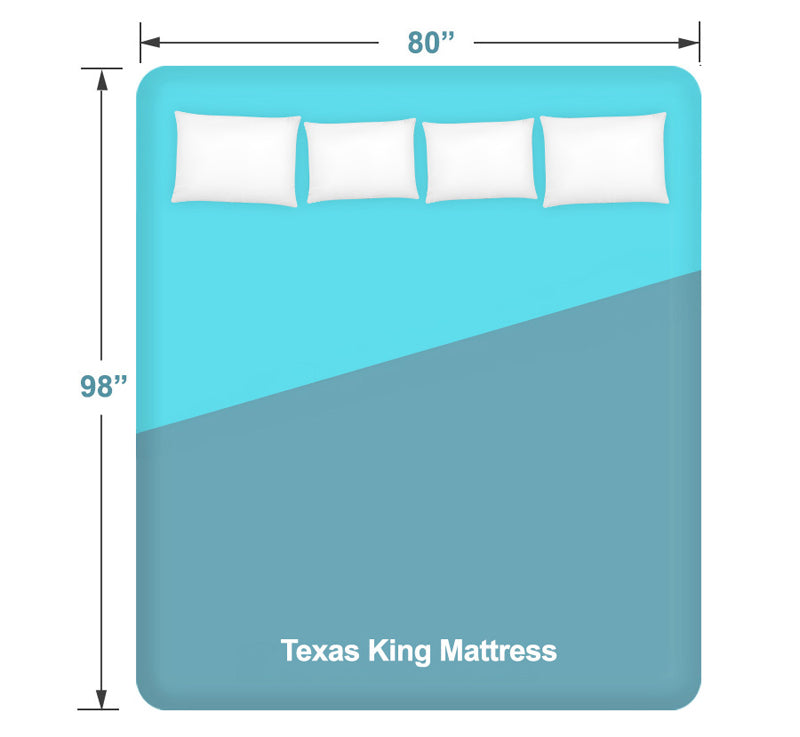
Texas King size bed dimensions: 80 x 98 inches.
Recommended room size: At least 12 x 14 feet.
Best for: Couples and families who co-sleep with kids or pets.
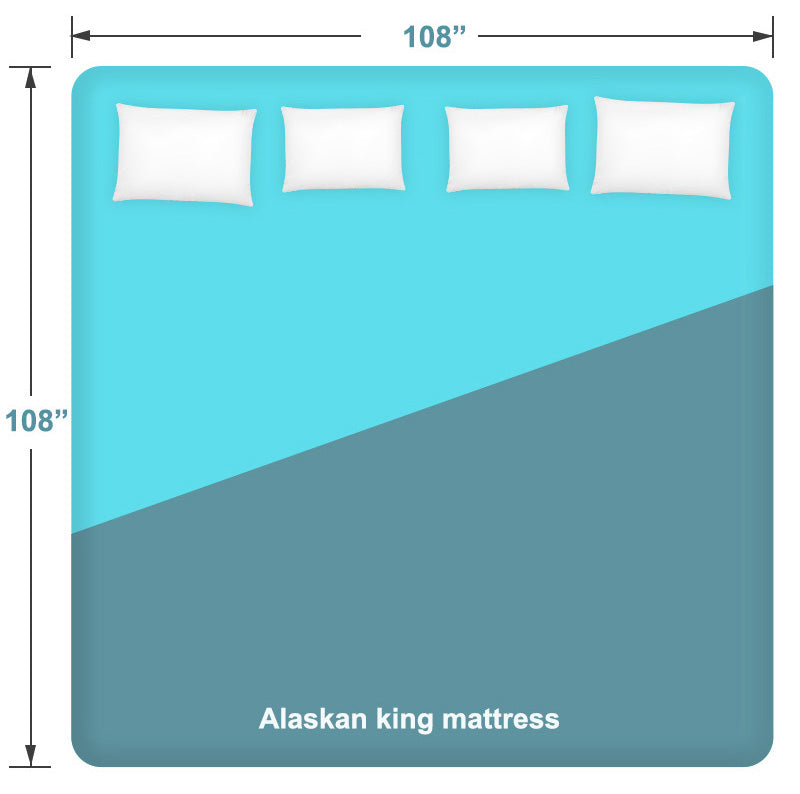
Alaskan King size bed dimensions: 108 x 108 inches.
Recommended room size: At least 18 x 18 feet (or a room with ample space).
Best for: Couples and families with multiple children or pets. This size is suitable for large master bedrooms or custom-made bed frames.
In the quest for a good night's sleep, your mattress size plays a key role. So, let's wrap things up with a simple takeaway: pick the best mattress size that fits you, not the other way around. Think of it like solving a puzzle. The problem is feeling cramped, restless, or just not quite comfy, and the solution is as simple as choosing the right mattress size.
Whether you go for the roomy Queen, perfect for couples who love their space, or the compact Twin XL, great for single sleepers or cozier rooms, remember, your mattress isn't just a piece of furniture; it's your sleep buddy. Make your choice wisely, and let it bring you the peaceful sleep you deserve.
A Twin XL mattress is not larger than a Queen; in fact, it's smaller in width. A Twin XL measures 39 inches wide and 80 inches long, suitable for taller individuals. In contrast, a Queen mattress is 60 inches wide and 80 inches long, offering 21 inches more width than a Twin XL, providing more sleeping space, making it preferable for couples or those wanting extra room.
Two Twin XL mattresses placed together do not form a Queen-sized bed; there will be a noticeable gap due to the difference in width.
However, when you put two Twin XL mattresses side by side, they align with the dimensions of a standard King-sized mattress, which measures 76 inches in width and 80 inches in length. This setup is commonly referred to as a "Split King" and is often used with adjustable bed frames, allowing each person to customize their mattress position independently.
Twin XL sheets will not fit a Queen size mattress properly. Twin XL sheets are designed to fit mattresses that are 39 inches wide and 80 inches in length, which is significantly smaller than the dimensions of a queen mattress (60 inches wide and 80 inches long). Attempting to use Twin XL sheets on a Queen size mattress will result in an ill-fitting sheet that won't cover the entire surface of the larger mattress.
Twin XL mattresses are designed for single sleepers, offering enough space for one person to sleep comfortably. For couples or those who want to share a bed, a Queen size mattress is often the preferred choice. The Queen mattress offers significantly more width compared to the Twin XL, making it a more suitable option for two people to sleep comfortably side by side.
Twin XL mattresses are one of the best mattresses for kids and teenagers. They provide extra length (measuring 80 inches) to accommodate growing bodies comfortably. Their space-efficient design suits smaller bedrooms and leaves room for other furniture and activities. They are budget-friendly without compromising on quality. As teenagers transition to college, Twin XL mattresses are commonly used in dorm rooms, making them a practical long-term investment.
Queen mattresses are more expensive than Twin XL mattresses. The larger size of a Queen mattress requires more materials, which contributes to the higher cost. Also, queen-sized bedding and accessories may be more expensive than their Twin XL counterparts.
No, a Twin XL size mattress is not the same as a Double mattress. These two mattress sizes differ in both dimensions and intended uses.
A Twin XL mattress typically measures 38 inches in width and 80 inches in length. It is narrower and longer compared to a standard Twin mattress. These mattresses are commonly used in college dorm rooms and are suitable for taller individuals who need the extra length. They are ideal for single sleepers.
A Double mattress, also known as a Full-size mattress, is 54 inches in width and 75 inches in length. It is wider but shorter than a Twin XL. These mattresses are designed for single sleepers who prefer more width. They are not as long as a Twin XL, so they may not be the best choice for taller individuals.
Bunk beds are chosen for their space-saving design, making them popular in smaller bedrooms or shared spaces. In this context, Twin XL mattresses are advantageous as they are narrower and longer, maximizing the use of vertical space without sacrificing comfort.
A Twin XL mattress topper will not fit a standard Twin mattress properly. The Twin XL is 5 inches longer than the standard Twin, measuring 38 inches wide by 80 inches long. Using a Twin XL topper on a Twin mattress may result in an improper fit, leaving excess material or gaps.
Related blog posts:
1. Mattress Sizes Chart and Bed Dimensions Guide
5. Twin vs. Full vs. Queen Mattress
Disclaimer: What is said in this article has been referenced from multiple sources and is intended only for educational and informational purposes. Please note that no content in this article is a substitute for professional advice from a qualified doctor or healthcare provider. Always consult an experienced doctor with any concerns you may have regarding a health condition or treatment, and never disregard any medical suggestions or delay in seeking treatment because of something you read here.
Notify me when available
We will send you a notification as soon as this product is available again.
We don't share your email with anybody


